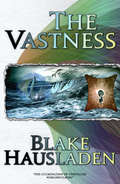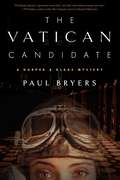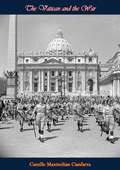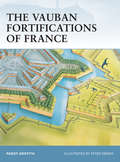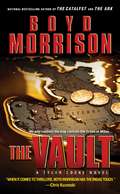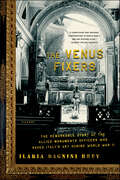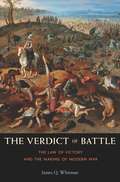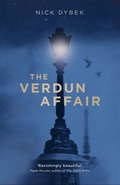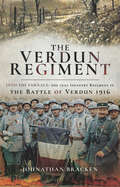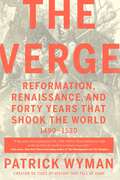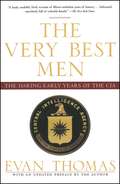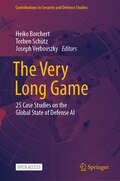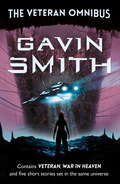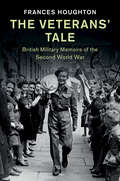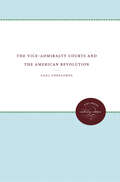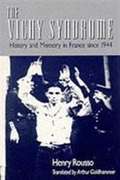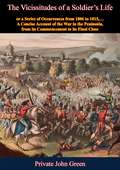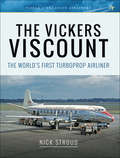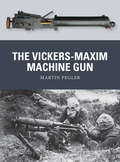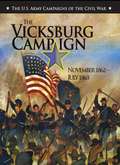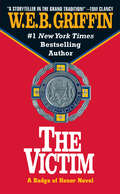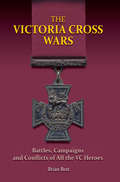- Table View
- List View
The Vastness (Vesteal Series #3)
by Blake Hausladen‘Blake excels at world-building, and his book is so detailed in so many areas that he either conducted an astounding amount of research...or he knows lots more than the average person.” – Kate Norlander, author of Geek CultureThe Vastness is the third and final omnibus collection to the Vesteal Series. The Vastness takes us deep into the capital of Bessradi, following the chaos of Native Silver, where new magic is emerging. A girl who lives inside her head with numbers becomes the center of a vast rebellion, while far to the north the people of Enhedu are scattered, their keep in ruins. Ghosts stir, the ground shakes, and an unknown magic has been unleashed. A desperate mission to the frozen edge of the world must be mounted in order to rescue Enhedu’s stolen children while the war for Zoviya tears down families, provinces, and religions. Blood becomes as important as air, and our characters struggle to keep the world balanced. The ending to this epic fantasy series is full of surprise and intrigue. In the end, the war will be over, but which side will win?"It reminds me a bit of Tolkien, so for those that love fantasy and an in depth story this book is a must read.” – Fleur, GoodreadsThe Vestal SeriesA tale of violent magic, intrigue, and statecraft, the Vesteal Series is the story of four souls that are banished beyond the edge of the map to a land of gnarled forests, ancient magic, and the site of a terrible murder. Their struggles to survive will put them at odds with their families, their nation, and the very powers that shaped the world.1. Ghosts in the Yew Novella 1 - Beyond the Edge Novella 2 - Opposing Oaths Novella 3 - Reckless Borders Novella 4 - Bayen's Women Novella 5 - Falling Tides2. Native Silver Novella 1 - Sutler's Road Novella 2 - Forgotten Stairs Novella 3 - Thrall's Wine Novella 4 - Corsair Princess Novella 5 - Tanayon Born 3. The Vastness Novella 1 - Silent Rebellion Novella 2 - The River War Novella 3 - The Blinded Novella 4 - Crimson Valley Novella 5 - Singer's Reward“Blake Hausladen takes you on a journey threw distant lands, romance, action, comedy, suspense,and mystery. The Vesteal series will easily be on of your favorites in your collection.” – Kyle, Goodreads
The Vatican Candidate: A Harper & Blake Mystery
by Paul Bryers Paul BryersApril 1945: Europe is in ruins, and Berlin is burning. As the Red Army closes in on the last few blocks surrounding the Fuhrerbunker, a famous aviatrix lands her light aircraft in the center of the shattered German capital. Two days later she takes off again. With her is a man called Heinrich Bechmann, SS mass killer and personal bodyguard of the German chancellor Adolf Hitler—and with Bechmann is a file of documents.Fast-forward to the fall of 2018, when Pope Francis announces that he intends to open the Vatican Secret Archives to researchers and historians investigating relations between his predecessor, Pope Pius XII, and the Nazi regime. A week later, masked gunmen kill five people at an isolated Jesuit retreat in the mountains of Sicily. And two weeks after that, the body of a celebrated British historian is discovered in a beach house on Long Island. Aiden Blake, ex–Royal Marine and brother of the dead historian, believes there is a mysterious link between these events, stretching across seventy-five years of history.He&’s right—and history itself will provide the clues. The trail will lead him and his brother&’s New York–based researcher, Hannah Harper, across the Atlantic to the hidden bunkers of Berlin, a Gothic castle in South Tyrol, Rome, Sicily, and deep into the past in a bid to find his brother&’s killers—and expose a neo-Fascist plot to kill the present pope and replace him with someone more conducive to the party&’s own political views and ambitions.
The Vatican and the War
by Camille Maximilian CianfarraCianfarra reports his findings on the actions of The Vatican during the Second World War. Famously neutral during a time of intense conflict, Pope Pius XII's public appearances neglected to overtly support either side. In his foreword to the book, the author speculates whether The Vatican would have aligned itself with whichever side ultimately found itself successful after the war. A longtime foreign correspondent for the New York Times, Cianfarra spent seven years living in Rome, and based much of his writing on personal experience.
The Vauban Fortifications of France
by Peter Dennis Paddy GriffithVauban was the foremost military engineer of France during the period of its centralisation and wars of expansion in the 17th and 18th centuries. His influence persisted long after Waterloo, and his name has become synonymous with the science of the construction, defence and attack of bastioned fortresses. Dunkirk, Toulon, Perpignan, Verdun and Brest stand out among the many historically significant sites created by this incredible engineer. This book examines the many achievements of this pivotal figure in fortification history, exploring the sites and their subsequent significance.
The Vault: A Novel
by Boyd MorrisonNational bestselling author Boyd Morrison brings back Tyler Locke, who must race to stop a terrorist cell that has stolen an ancient text related to the tale of King Midas in this, "heart-thumping ride...not to be missed" (Steve Berry).Tyler Locke's routine commute on a Washington State ferry is interrupted by a chilling anonymous call: his father has been kidnapped, and a truck bomb is set to detonate on board in twenty minutes. When Tyler reaches the bomb on the boat's car deck, he's stunned to find classical languages expert Stacy Benedict waiting for him. She's received the same threat, and her sister has also been taken.In order to disarm the bomb, Tyler and Stacy must work together to solve an engineering puzzle--a puzzle written in ancient Greek. But preventing the explosion is only the first step; they soon learn the entire setup is a test created by a ruthless criminal who forces them to go on a seemingly impossible mission: uncover the legendary lost riches of King Midas.Tyler and Stacy have just five days to track down the gold. Armed with an ancient manuscript penned by brilliant Greek inventor Archimedes, they begin a quest to unravel a two-thousand-year-old mystery whose answer is hidden within the workings of a cryptic artifact: the Antikythera Mechanism, a device designed by Archimedes himself. To save their loved ones and prevent their captors from recovering a treasure that will finance unspeakable devastation, the two scramble to Italy, Germany, Greece, and finally to the streets of New York City in a race against the clock to find the truth behind the story of King Midas.The Vault combines an explosive premise and blistering pace with a fascinating exploration of one of history's most intriguing inventors and a brilliant reimagining of an ancient legend.
The Venona Secrets: The Definitive Exposé of Soviet Espionage in America (Cold War Classics)
by Herbert Romerstein Eric BreindelThe Venona Secrets presents one of the last great, untold stories of World War II and the Cold War. <P><P> In 1995, secret Soviet cable traffic from the 1940s that the United States intercepted and eventually decrypted finally became available to American historians. Now, after spending more than five years researching all the available evidence, espionage experts Herbert Romerstein and Eric Breindel reveal the full, shocking story of the days when Soviet spies ran their fingers through America's atomic-age secrets. <P><P> Included in The Venona Secrets are the details of the spying activities that reached from Harry Hopkins in Franklin Roosevelt s White House to Alger Hiss in the State Department to Harry Dexter White in the Treasury.
The Ventriloquists: A Novel
by E.R. Ramzipoor“[A] remarkable saga.... Engrossing.” —Booklist, starred reviewIn this triumphant debut inspired by true events, a ragtag gang of journalists and resistance fighters risk everything for an elaborate scheme to undermine the Reich.The Nazis stole their voices. But they would not be silenced.Brussels, 1943. Twelve-year-old street orphan Helene survives by living as a boy and selling copies of the country’s most popular newspaper, Le Soir, now turned into Nazi propaganda. Helene’s world changes when she befriends a rogue journalist, Marc Aubrion, who draws her into a secret network that publishes dissident underground newspapers.The Nazis track down Aubrion’s team and give them an impossible choice: turn the resistance newspapers into a Nazi propaganda bomb that will sway public opinion against the Allies, or be killed. Faced with no decision at all, Aubrion has a brilliant idea. While pretending to do the Nazis’ bidding, they will instead publish a fake edition of Le Soir that pokes fun at Hitler and Stalin—daring to laugh in the face of their oppressors.The ventriloquists have agreed to die for a joke, and they have only eighteen days to tell it.Featuring an unforgettable cast of characters and stunning historical detail, E.R. Ramzipoor’s dazzling debut novel illuminates the extraordinary acts of courage by ordinary people forgotten by time. It is a moving and powerful ode to the importance of the written word and to the unlikely heroes who went to extreme lengths to orchestrate the most stunning feat of journalism in modern history.
The Venus Fixers: The Remarkable Story of the Allied Monuments Officers Who Saved Italy's Art During World War II
by Ilaria Dagnini BreyIn 1943, while the world was convulsed by war, a few visionaries -- in the private sector and in the military -- committed to protect Europe's cultural heritage from the indiscriminate ravages of World War II.In the midst of the conflict, the Allied Forces appointed the monuments officers—a motley group of art historians, curators, architects, and artists—to ensure that the great masterworks of European art and architecture were not looted or bombed into oblivion. The journalist Ilaria Dagnini Brey focuses her spellbinding account on the monuments officers of Italy, quickly dubbed "the Venus Fixers" by bemused troops.Working on the front lines in conditions of great deprivation and danger, these unlikely soldiers stripped the great galleries of their incomparable holdings and sent them into safety by any means they could. They worked with skeptical army strategists to make sure air raids didn't take out the heart of an ancient city, and patched up Renaissance palazzi and ancient churches whose lead roofs were sometimes melted away by the savagery of the attacks. Sometimes they failed. But to an astonishing degree, they succeeded, and anyone who marvels at Italy's artistic riches today is witnessing their handiwork.In the course of her research, Brey gained unprecedented access to private archives and primary sources, and the result is a book at once thorough and grandly entertaining—a revelatory take on a little-known chapter of World War II history. The Venus Fixers is an adventure story with the gorgeous tints of a Botticelli landscape as its backdrop.
The Verdict of Battle: The Law Of Victory And The Making Of Modern War
by James Q. WhitmanToday, war is considered a last resort for resolving disagreements. But a day of staged slaughter on the battlefield was once seen as a legitimate means of settling political disputes. James Whitman argues that pitched battle was essentially a trial with a lawful verdict. And when this contained form of battle ceased to exist, the law of victory gave way to the rule of unbridled force. The Verdict of Battle explains why the ritualized violence of the past was more effective than modern warfare in bringing carnage to an end, and why humanitarian laws that cling to a notion of war as evil have led to longer, more barbaric conflicts. Belief that sovereigns could, by rights, wage war for profit made the eighteenth century battle’s golden age. A pitched battle was understood as a kind of legal proceeding in which both sides agreed to be bound by the result. To the victor went the spoils, including the fate of kingdoms. But with the nineteenth-century decline of monarchical legitimacy and the rise of republican sentiment, the public no longer accepted the verdict of pitched battles. Ideology rather than politics became war’s just cause. And because modern humanitarian law provided no means for declaring a victor or dispensing spoils at the end of battle, the violence of war dragged on. The most dangerous wars, Whitman asserts in this iconoclastic tour de force, are the lawless wars we wage today to remake the world in the name of higher moral imperatives.
The Verdun Affair: A Novel
by Nick Dybek“The Verdun Affair is ravishingly beautiful, and as much about love as about war. Nick Dybek is a storyteller of great power.” —Paula McLain, author of The Paris Wife and Circling the Sun A sweeping, romantic, and profoundly moving novel, set in Europe in the aftermath of World War I and Los Angeles in the 1950s, about a lonely young man, a beautiful widow, and the amnesiac soldier whose puzzling case binds them together even as it tears them apart.In 1921, two young Americans meet in Verdun, the city in France where one of the most devastating battles of the war was waged. Tom is an orphan from Chicago, a former ambulance driver now gathering bones from the battlefield; Sarah is an expatriate from Boston searching for the husband who wandered off from his division and hasn’t been seen since. Quickly, the two fall into a complicated affair against the ghostly backdrop of the ruined city. Months later, Sarah and Tom meet again at the psychiatric ward of an Italian hospital, drawn there by the appearance of a mysterious patient the doctors call Douglas Fairbanks (after the silent film actor)—a shell-shocked soldier with no memory of who he is. At the hospital, Tom and Sarah are joined by Paul, an Austrian journalist with his own interest in the amnesiac. Each is keeping a secret; each has been shaken by the horrors of war. Decades later, Tom, now a successful screenwriter, encounters Paul by chance in LA, still grappling with the questions raised by this gorgeous and incisive novel: How to begin again after unfathomable trauma? How to love after so much loss? And who, in the end, was Douglas Fairbanks? From the bone-strewn fields of Verdun to the bombed-out cafés of Paris, from the riot-torn streets of Bologna to the riotous parties of 1950s Hollywood, The Verdun Affair is a riveting tale of romance, grief, and the far-reaching consequences of a single lie.
The Verdun Affair: A Novel
by Nick Dybek'The Verdun Affair is ravishingly beautiful, and as much about love as about war . . . Dybek is a storyteller of great power. If there's any justice, this novel will be widely read and recognized. I absolutely adored it' Paula McLain, bestselling author of THE PARIS WIFE and CIRCLING THE SUNA sweeping, romantic, and profoundly moving novel, set in Europe in the aftermath of World War I and Los Angeles in the 1950s, about a lonely young man, a beautiful widow, and the amnesiac soldier whose puzzling case binds them together even as it tears them apart.In 1920, two young Americans meet in Verdun, the city in France where one of the most devastating battles of the war was waged. Tom is an orphan from Chicago, a former ambulance driver now gathering bones from the battlefield; Sarah is an expatriate from Boston searching for the husband who wandered off from his division and hasn't been seen since. Quickly, the two fall into a complicated affair against the ghostly backdrop of the ruined city. Months later, Sarah and Tom meet again at the psychiatric ward of an Italian hospital, drawn there by the appearance of a mysterious patient the doctors call Douglas Fairbanks (after the silent film actor) - a shell-shocked soldier with no memory of who he is. At the hospital, Tom and Sarah are joined by Paul, an Austrian journalist with his own interest in the amnesiac.Each is keeping a secret; each has been shaken by the horrors of war. Decades later, Tom, now a successful screenwriter, encounters Paul by chance in LA, still grappling with the questions raised by this gorgeous and incisive novel: How to begin again after unfathomable trauma? How to love after so much loss? And who, in the end, was Douglas Fairbanks?From the bone-strewn fields of Verdun to the bombed-out cafés of Paris, from the riot-torn streets of Bologna to the riotous parties of 1950s Hollywood, The Verdun Affair is a riveting tale of romance, grief and the far-reaching consequences of a single lie.
The Verdun Regiment: Into the Furnace: The 151st Infantry Regiment in the Battle of Verdun 1916
by Johnathan BrackenAlthough the French fielded the largest number of Allied troops on the Western Front in the First World War, the story of their soldiers is little known to English readers. The immense size of the French armies, the number of battles they fought, and the enormous losses they incurred, make it difficult for us to comprehend their experience. But we can gain a genuine insight by focusing on one of the defining battles of that war, at Verdun in 1916, and by looking at it through the eyes of a small group of soldiers who served there. That is what Johnathan Bracken does in this meticulously researched, detailed and vivid account.The French 151st Infantry Regiment spent fifty days under fire at Verdun in 1916 and another thirty-five in 1917, and lost 3,200 soldiers killed or wounded. Yet their ordeal was no different from that of hundreds of other infantry units that fought and endured in this meat-grinder of a battle. Their diaries and memoirs tell their story in the most compelling way, and through their words the larger human story of the French soldier during the war comes to life.
The Verge: Reformation, Renaissance, and Forty Years that Shook the World
by Patrick WymanThe creator of the hit podcast series Tides of History and Fall of Rome explores the four explosive decades between 1490 and 1530, bringing to life the dramatic and deeply human story of how the West was reborn. In the bestselling tradition of The Swerve and A Distant Mirror, The Verge tells the story of a period that marked a decisive turning point for both European and world history. Here, author Patrick Wyman examines two complementary and contradictory sides of the same historical coin: the world-altering implications of the developments of printed mass media, extreme taxation, exploitative globalization, humanistic learning, gunpowder warfare, and mass religious conflict in the long term, and their intensely disruptive consequences in the short-term.As told through the lives of ten real people—from famous figures like Christopher Columbus and wealthy banker Jakob Fugger to a ruthless small-time merchant and a one-armed mercenary captain—The Verge illustrates how their lives, and the times in which they lived, set the stage for an unprecedented globalized future.Over an intense forty-year period, the seeds for the so-called "Great Divergence" between Western Europe and the rest of the globe would be planted. From Columbus's voyage across the Atlantic to Martin Luther's sparking the Protestant Reformation, the foundations of our own, recognizably modern world came into being.For the past 500 years, historians, economists, and the policy-oriented have argued which of these individual developments best explains the West's rise from backwater periphery to global dominance. As The Verge presents it, however, the answer is far more nuanced.
The Very Best Men: The Daring Early Years of the CIA
by Evan ThomasDrawing on extensive interviews with old spooks and the social friends and family of his subjects, The Very Best Men is a fascinating narrative that brings to life a crucial piece of American history.The Very Best Men is the story of the CIA's early days as told through the careers of four glamorous, daring, and idealistic men who ran covert operations for the government from the end of World War II to Vietnam. Evan Thomas re-creates the personal dramas and sometimes tragic lives of Frank Wisner, Richard Bissell, Tracy Barnes, and Desmond FitzGerald, who risked everything to contain the Soviet threat. Within the inner circles of Washington, they were regarded as the best and the brightest. They planned and acted to keep the country out of war -- by stealth and "political action" and to do by cunning and sleight of hand what great armies could not, must not be allowed to do. In the end, they were too idealistic and too honorable, and were unsuited for the dark, duplicitous life of spying. Their hubris and naïveté led them astray, producing both sensational coups and spectacular blunders like the Bay of Pigs and the failed assassination attempts on foreign leaders in the early 1960s. Thomas draws on the CIA's own secret histories, to which he has had exclusive access, as well as extensive interviews, to bring to life a crucial piece of American history.
The Very Long Game: 25 Case Studies on the Global State of Defense AI (Contributions to Security and Defence Studies)
by Joseph Verbovszky Heiko Borchert Torben SchützThis open access book is the outcome of a unique multinational effort organized by the Hamburg-based Defense AI Observatory (DAIO) to portray the current state of affairs regarding the use of artificial intelligence (AI) by armed forces around the world. The contributions span a diverse range of geostrategic contexts by providing in-depth case studies on Australia, Canada, China, Denmark, Estonia, Finland, France, Germany, Greece, India, Iran, Israel, Italy, Japan, the Netherlands, Russia, Singapore, South Korea, Spain, Sweden, Taiwan, Turkey, Ukraine, the UK, and the United States. The book does not speculate about the future implications of AI on armed forces, but rather discusses how armed forces are currently exploring the potential of this emerging technology. By adopting a uniform analytical framework, each case study discusses how armed forces view defense AI; how they are developing AI-enhanced solutions, adapting existing structures and processes, and funding their defense AI endeavors; to what extent defense AI is already fielded and operated; and how soldiers and officers are being trained to work with AI.
The Veteran Omnibus
by Gavin G. Smith'an exceptional talent' Peter F. HamiltonMy name is Jakob Douglas, ex-special forces. I fought Them. Just like we've all been doing for 60 bloody years. But I thought my part in that was done with. Three hundred years in our future, in a world of alien infiltrators, religious hackers, a vast convoying nation of Nomads, city sized orbital elevators, and a cyborg pirate king who believes himself to be a mythological demon Jakob is having a bad day. VETERAN is a fast paced, intricately plotted violent SF Thriller set in a dark future against the backdrop of a seemingly never ending war against an unknowable and implacable alien enemy.In WAR IN HEAVEN, the high-powered sequel to VETERAN, an unlikely hero makes an even more unlikely return to take the reader back into a vividly rendered bleak future. But a bleak future where there are still wonders: man travelling out into the universe, Bladerunner-esque cities hanging from the ceilings of vast caverns, aliens that we can barely comprehend.Gavin Smith writes fast-moving, incredibly violent SF thrillers but behind the violence and the thrills lies a carefully thought out story and characters who have far more to them than first meets the eye.Never one to avoid controversy Gavin Smith nevertheless invites you to think beyond the initial shock of what you have just read. But in the meantime? Another fire-fight, another chase another flight of imagination.
The Veterans' Tale: British Military Memoirs of the Second World War (Studies in the Social and Cultural History of Modern Warfare)
by Frances HoughtonThis is a unique account of the ways in which British veterans of the Second World War remembered, understood, and recounted their experiences of battle throughout the post-war period. Focusing on themes of landscape, weaponry, the enemy, and comradeship, Frances Houghton examines the imagery and language used by war memoirists to reconstruct and review both their experiences of battle and their sense of wartime self. Houghton also identifies how veterans' memoirs became significant sites of contest as former servicemen sought to challenge what they saw as unsatisfactory official, scholarly, and cultural representations of the Second World War in Britain. Her findings show that these memoirs are equally important both for the new light they shed on the memory and meanings of wartime military experience among British veterans, and for what they tell us about the cultural identity of military life-writing in post-war British society.
The Vice-Admiralty Courts and the American Revolution (Published by the Omohundro Institute of Early American History and Culture and the University of North Carolina Press)
by Carl UbbelohdeThis study describes the courts of vice-admiralty as they existed in the American colonies at the beginning of the revolutionary struggles, analyzes the changes in the courts and their jurisdiction from 1763 to the outbreak of the war, and examines the American objections to the vice-admiralty system.Originally published in 1960.A UNC Press Enduring Edition -- UNC Press Enduring Editions use the latest in digital technology to make available again books from our distinguished backlist that were previously out of print. These editions are published unaltered from the original, and are presented in affordable paperback formats, bringing readers both historical and cultural value.
The Vichy Syndrome: History and Memory in France since 1944
by Henry RoussoTranslated by Arthur Goldhammer. From the Liberation purges to the Barbie trial, France has struggled with the memory of the Vichy experience: a memory of defeat, occupation and repression.The author explores what the French have chosen to remember and what they have chosen to conceal.
The Vicissitudes of a Soldier’s Life: or a Series of Occurrences from 1806 to 1815,…A Concise Account of the War in the Peninsula
by Private John GreenAnother fascinating view from the ranks of the British Army during the Napoleonic Wars.John Green was born in Nottingham in 1790, but bored of life as an apprentice carpet maker he fled to sea on a privateer and after a short cruize enlisted in the 68th Regiment of Foot as a private. As he recounts in his memoirs his life was hard, brutal and often deadly; his regiment was sent to the fever riven isle of Walcheren before a posting to the armies of Sir Arthur Wellesley in the Peninsula. Green and his comrades fought with great distinction in the Peninsular Wars, especially at the battles of Salamanca and Vitoria before Green was seriously wounded and sent back to England.
The Vickers Viscount: The World's First Turboprop Airliner (Aircraft Ser.)
by Nick StroudBy some margin the most successful British medium-range airliner ever produced, the world-beating Viscount was a sublime combination of Vickers state-of-the-art postwar design and Rolls-Royces cutting-edge power-plant technology, both companies being at the very peak of their powers during the types genesis and evolution.Tracing its origins back to the wartime Brabazon Committee, the Viscount was one of several designs from various British aircraft manufacturers produced to fulfill the committees specifications for a fast, economical short- to medium-range airliner to satisfy the demands of the burgeoning postwar civil aviation market, which was predicted to grow at a healthy rate over the following decades. Vickers chief designer and Managing Director George Edwards was quick to respond, the result being the Dart turboprop-powered Vickers V.630, which made its first flight in July 1948, despite its future looking uncertain after British European Airways having twenty examples of ordered its chief rival, Airspeeds Ambassador, six months before. The Viscount nevertheless entered full service with BEA in 1953, much to the relief of its manufacturer, orders flooding in thereafter from numerous airlines and air forces all over the world. Ultimately, some 200 individual airlines, companies and organizations in more than eighty countries operated the dependable and, crucially, development-friendly Viscount over its long and distinguished career.This book tells the full story of the worlds first turboprop airliner, from its Brabazon Committee beginnings, through its early flight trials program and entry into service, to its almost unassailable position as the worlds number one medium-haul turboprop, including its astonishing breakthrough in the USA, where it single-handedly broke the big American manufacturers stranglehold on the airliner market. The types military career is also covered, as is its construction; also included in this volume are details of the numerous variants produced and those of the 444 built still surviving as exhibits today, along with twenty-four superb artworks by world-renowned aviation illustrator Juanita Franzi.
The Vickers-Maxim Machine Gun
by Peter Dennis Martin PeglerThe world's first self-powered machine gun, the Maxim gun became a potent symbol of Victorian colonialism in the closing years of the 19th century. It was the brainchild of Sir Hiram Maxim, the American-born firearms inventor who founded the company bearing his name with financing from Albert Vickers, who became the company's chairman; Maxim's company was absorbed by Vickers, Sons and Company in 1897. Subsequent variants in British, German and Russian service - the .303in Vickers (1912), 7.92mm MG 08 (1908) and 7.62mm PM M1910, respectively - dominated both the Eastern and Western Fronts during World War I and soldiered on into World War II, while the Vickers remained in front-line British service essentially unchanged until 1968.The .577/450in Maxim's revolutionary design eschewed the hand-cranking required by previous rapid-firing guns, instead harnessing the weapon's recoil energy to eject each spent cartridge and insert the next. Water-cooled and capable of 600 rounds per minute, it was often mounted on a tripod and belt-fed, unlike earlier models such as the Gardner and the Gatling, which were usually mounted on horse carriages and hopper-fed. First demonstrated in 1884, the Maxim was adopted by the British Army in 1888 and saw service in the First Matabele War (1893-94); in one incident, 50 soldiers with four Maxims fought off 5,000 warriors. Although it was hampered by its weight and easily spotted (before the advent of smokeless powder) owing to the clouds of smoke it produced while firing, the Maxim was considered more reliable than its contemporaries; its very presence on the battlefield was believed to give its users a significant psychological advantage over their opponents. Even so, the armies of many nations remained skeptical about the reliability of machine guns in general, and at the outset of World War I only two were attached to each infantry battalion of the British Expeditionary Force.
The Vicksburg Campaign, November 1862-July 1863 [Illustrated Edition]
by Dr Christopher Gabel[Includes over 12 illustrations and 2 maps]The campaign for the control of Vicksburg was one of the most important contests in determining the outcome of the Civil War. As President Abraham Lincoln observed, "Vicksburg is the key. The war can never be brought to a close until that key is in our pocket." The struggle for Vicksburg lasted more than a year, and when it was over, the outcome of the Civil War appeared more certain.The centerpiece of the Vicksburg campaign was the Mississippi River, just as the great river is the centerpiece of the North American continent. The Mississippi and its tributaries drain over a million square miles of territory in the United States and Canada. These waterways included twenty thousand miles of navigable water, extending from Montana to Pennsylvania and from Minnesota to the Gulf of Mexico, making possible the large scale settlement of the west. Between 1810 and 1860, the number of whites residing west of the Appalachians swelled from one million to fifteen million, thanks in large part to the availability of navigable waterways. The black population, mostly slaves, grew from two hundred thousand to over two million, concentrated along the Mississippi. The rivers of the Mississippi basin provided an economic outlet for corn and hogs raised in Iowa and Ohio, as well as the sugar and cotton grown on the great plantations of Louisiana and Mississippi. By 1860, railroads were beginning to penetrate the region, but access to these western rivers remained vital to the economy of both the Midwest and the Deep South.
The Victim (Badge of Honor #3)
by W.E.B. GriffinW. E. B. Griffin has captured a worldwide audience with his stunning novels of men and women of outstanding courage. BROTHERHOOD OF WAR revealed the drama and challenge of army life. . . THE CORPS explored the proud tradition of the Marines. . . Now BADGE OF HONOR takes you behind the scenes of today's urban police force. A brutal Mafia slaying rocks the city of Philadelphia when the only living witness is revealed--a wealthy debutante involved with the targeted mobster. One of the suspects is a cop, Matt Payne, who unwittingly takes on the ultimate battle between organized crime, upper-class power. . . and his own police force. .
The Victoria Cross Wars: Battles, Campaigns and Conflicts of All the VC Heroes
by Brian BestThe British Empire at its height stretched around the globe. From Asia to the Americas, scores of countries were conquered or assimilated into the greatest commonwealth of nations in history. Many of these countries were won, and held, at the point of the bayonet, and British soldiers and sailors fought long and hard campaigns in deserts, mountains and jungles to maintain and expand the Empire. Fighting, though, means bloodshed; it also means bravery. Victoria Crosses were awarded in operations against Persia, Abyssinia and China, in New Zealand, Burma and Sudan, in the Perak War, the Andaman Islands Expedition and the Mashona Rebellion to name but a few of the forty-four different campaigns of the colonial era.The Victoria Cross Wars explains Britains involvement in these little-known and forgotten campaigns and details the battles and engagements that resulted in the granting of the most highly regarded award for valor in the face of the enemy. The greater conflicts of the twentieth century receive due treatment as do more recent operations in the troubled parts of the world.A total of 1,358 VCs have been awarded since the cross of valor was first instituted in 1855, the latest of which was announced in February 2015. The stories behind the awarding of these medals have been repeated in countless anthologies but The Victoria Cross Wars explains not just what the men did, but why they were there and what they were fighting for.
